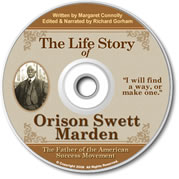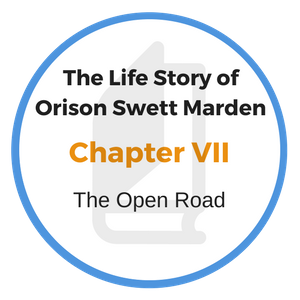- Home
- Self Growth Library
- Orison Swett Marden Chapter V
Orison Swett Marden Chapter V
Life In A New England Parsonage
The Life Story of Orison Swett Marden Chapter V:
Orison did not remain very long with his first master. From the beginning he felt that his guardian's conduct toward him was not kind or just, and, naturally, he resented being "hired out" and treated as the family drudge.
For some reason unknown to him, the boy was removed from the Glover home and placed in the family of Elder Strong, the Baptist minister in the same place, — Woodstock.
"My guardian," Doctor Marden says, "being a Baptist himself, and a deacon of the church, always took care that I went into Baptist families.
"Elder Strong's salary was only a pittance, supplemented by the yearly 'donation' of the parishioners. He had a little farm, but as the country all around was exceedingly rough and rocky and the soil barren, the produce from the farm was very scant. His parishioners, of course, expected that their minister and his wife would devote themselves body and soul to the parish, so there was no time to give to 'intensive' cultivation of the farm.
The wife, in addition to visiting all the sick people in the parish as well as those who were in trouble of any kind, was also expected, although not a strong woman, to go and help out wherever she was needed.
"The minister was expected to maintain the dignity of his position by dressing well on all occasions, and if he ever appeared abroad without his long black coat, white collar, and black tie, there was a scandal in the neighborhood.
The church people seemed to imagine that there was some connection between their pastor's religion and his black coat and tie, and that it was irreligious for him to go about without them, especially when calling on his parishioners.
"This made additional work and anxiety for Mrs. Strong; for as the Elder had only one professional suit, she was obliged to keep it sponged and pressed and in good shape. But in spite of her care it would get very shiny, and threadbare at the knees and elbows, before he could replace it with a new one.
"A bound-out orphan did not seem to have any rights to speak of. His
duty was to work. He had no other use and got very little sympathy, very
few favors."
"In this backwoods community, twenty-four miles from the nearest railroad station, everything was exceedingly primitive. In the summer time many of the men, some of the women, and all of the children, went to the little church or meeting-house on Sundays barefooted. Yet, even in this remote place, the mistress of the parsonage would have to make her clothes over and over again, patching them up here and there, trying as best she could to keep somewhere near up to what the more well-to-do women of the parish were wearing. In two years she did not have more than one new dress, nor in that time did she have new shoes or a new bonnet.
"The occasion of the yearly 'donation' was an extra hard time for her. It came late in the Fall after the crops had been gathered. Nearly all of the men of the congregation were farmers and, instead of bringing to the 'donation' the things their pastor's family most needed, they would bring what they could best spare, — the vegetables and other things of which they had a surplus. For instance, when the potato crop was good, almost everybody would bring potatoes. When cabbages were plenty, they would bring cabbages. When apples and other fruits were abundant, they would contribute fruits.
Very few brought sugar, flour, or any of the staple groceries. As a matter of fact, however, it was a rare thing for anybody in that section to have such 'boughten goods' in the house. But it was noticeable that many of the donations — the vegetables, fruit, etc.—were 'seconds.' The good people seemed to think that the receiver would be glad to get almost anything. The day after such a party it was my duty to pick out the specked apples that had been brought and feed them to the cow and the pig!
"Before each great yearly event Mrs. Strong would have cake and pies made, and what other dainties she could manage to provide, for everybody who brought a contribution would expect to get a good supper. And what appetites they had! They would eat up about all that had been cooked, besides many of the things they had brought themselves.
"The parsonage was as shabby looking as its occupants; its furniture as poor and scanty as their clothing. The table and the stiff horse-hair-upholstered chairs in the parlor were old, rickety, and worn, and the floor uncarpeted, and the rest of the place was in worse condition. Yet those who came to these donation parties seemed to take a delight in going through the rooms, peeking into closets and cupboards, and then gossiping about what they saw, — wondering why their hosts had this or didn't have that!
"There was very little money among farmers in those days. I remember that the sight of a dollar was a great curiosity to me. It must have been almost as great to the Strongs, for they seldom went to a store for anything but tea. Mrs. Strong would burn bread crusts, especially of brown bread, now and then to make what she called 'coffee,' for 'boughten' or store-bought coffee was a luxury unknown; and she would use the tea leaves over and over again until the so-called tea was almost as colorless as water. In fact, there was so little money and food was so scarce that everything had to be eked out with the most severe economy."
The change to this poverty-stricken, backwoods parsonage certainly did not improve the outlook of the orphan lad. One would have thought that in the house of the "man of God," however difficult the circumstances, he would at least have met the boy with sympathy and kindness. But such was not the case, and in some ways things were even worse than they had been in the first "bound-out" home.
The minister had no children, and the atmosphere of the parsonage, surcharged with the rigid Baptist doctrine of those days, was gloomy and depressing. This might have been relieved had the boy been allowed to play with the children in the neighborhood, but it was heightened rather by the fact that he was only permitted now and then to look over a high fence to see them at their games.
He did not know what it was to get a "square meal." Like poor little Oliver Twist, he was chronically hungry; and to ask for more would have been as great a crime for Orison as it was for Oliver — and just as useless.
Moreover, he had to work harder than before. Not only did he saw wood and do the chores and whatever farm work he was equal to, but he was also trained to do much of the housework, including the family washing and cooking.
In his whimsical way, in speaking of the first meal he prepared, he said: "It seemed to me that Mrs. Strong herself knew next to nothing about cooking, yet she insisted upon breaking me into the mysteries of this occult art by setting me, at the outset, to get dinner. Although I knew as much about cooking as a law student, who was a classmate of mine in after years, knew about law, and whom we nicknamed 'Necessity', - because he knew no law, — I wouldn't have minded the cooking so much if I had been allowed to cook enough. But the preparation of this first meal showed me what to expect in my new home.
"I was sent down to the cellar, first of all, to get potatoes, and, not knowing the peculiarities of the family, I brought up a good-sized pan full, which I thought would be none too much for three hungry people. When Mrs. Strong looked into the pan she threw up her hands in amazement, exclaiming, 'What in the world are you going to do with all those potatoes?'
"Cook them for dinner, ma'am,” I replied.
"You'll do nothing of the kind,” she said. “Come with me and I'll show you what to do.”
"Returning to the cellar with me, she pointed to a bin containing large potatoes, saying, 'These are for the Elder, who needs a special kind. And these, turning to another bin, full of little ones, 'are for you and me.' She then ordered me to take one potato from the Elder's bin, and two from the other — one for me and one for herself — assuring me that 'enough is enough,' and that 'three potatoes make a great plenty for one meal'.
"I emptied the pan of potatoes, and took three as directed, washed and put them to boil, — feeling all the time that six would have been a fair allowance for myself alone! I seldom got up from the table without feeling that I could have eaten everything that had been put on it. Many a time I would go out into the woods in the Fall to gather nuts to have on hand to eke out my meals. These I would hide in the woodshed, with some apples gathered from a few scraggly apple-trees that grew on the farm.
"The minister had a cow, which I learned to milk. I also churned the cream, in a little dasher churn. Most of the butter had to go to the Elder, and in my boyish imagination I fancied that it must have been one of the necessities of his life, just as I imagined that the particular kind of potato that always had to be cooked for him must have had something to do with the quality of his sermons. I was not allowed any butter at the table, and if a visitor happened to be at meals and should pass it to me, I was obliged to say that I didn't eat butter!
About the only butter I had was what would come up on the dasher when churning. These little stray bits I would take off and eat when no one was looking."
"There is no failure for the man who realizes his power, who never knows when he is beaten; there is no failure for the determined endeavor; the unconquerable will. There is no failure for the man who gets up every time he falls, who rebounds like a rubber ball, who persists when everyone else gives up, who pushes on when everyone else turns back."
- Orison Swett Marden
Orison Swett Marden Chapter V , continued...
Mrs. Strong was of a naturally suspicious disposition, and, as far as possible, kept everything under lock and key. Her great poverty sharpened her wits and increased her watchfulness, so that the boy, no matter how faint with hunger, did not dare to take a slice of bread, a doughnut, or anything else from the pantry lest she might miss it.
After making her parish calls, she always examined the cupboards to see that nothing had been tampered with. Sometimes, when driven to desperation, the boy would break off morsels of bread and take a tiny bit here and there of things he thought wouldn't be missed. Or he would take a pinch of flour and dissolve it in water and drink it.
Yet all the time he was working like a slave twelve or fourteen hours a day. When not at work outdoors, he was engaged indoors, cooking, washing dishes and scrubbing floors. This latter had to be done very thoroughly, for his mistress, like all other New England housekeepers, had a heightened detest for, and pursuit of, dirt in all forms. She was always watching the boy to see that he brought no dirt into the house on his feet.
Out of the regular farm season the balance of his time was employed in picking up stones, which were covering almost the entire farm. The sharp stones cut the tender young fingers and left a trail of blood as he followed from day to day his dreary, endless task.
"Washing the clothes and the family dishwashing were particularly trying for me," he says, "because I was obliged to pick stones so much of the time on the farm that the skin was nearly always worn through on my fingers. They would often bleed, and so much washing and scrubbing kept them very tender."
Truly, when speaking of this period of his life, he put it very mildly when he said that "a bound-out orphan did not seem to have any rights to speak of. His duty was to work. He had no other use and got very little sympathy, very few favors."
No work that was not absolutely indispensable was done in the minister's house on Sunday. Even in preparation for the family washing Orison was not allowed to put the clothes in soak Sunday night, because that would be "an unnecessary act."
All the cooking that could possibly be done for that day was done on Saturday, so that the family ate mostly cold things on the Sabbath. With his irrepressible sense of humor, which nothing could crush or dampen, the boy noticed that "it did not seem so wicked for the Elder's wife to make tea, because they were both so fond of it, but to bake bread or biscuit, or anything else of that kind, would have been unpardonable.
Neither did the quarreling of the worthy pair seem to be on the prohibited list on Sunday, for they would often get into a very heated argument. But at night they were both on their knees and ended the day with long prayers.
I remember being reprimanded very severely on such an occasion for getting something to put under my knees to keep them off the bare floor during the prayer time. And once when the minister was praying aloud and I thought he wouldn't notice me, I got a terrible scolding for looking around for the cat."
While there was no manual work on Sunday, the so-called "day of rest" was even a more terrible day of torture to the boy than any of the six days of physical labor. The minister and his wife took him to church with them in the morning, and as they remained for afternoon service they took a cold lunch with them.
This meant practically the whole day, for the Puritan services were long. And oh, how they weighed upon the soul of the boy! His body, weakened by hunger, left his young mind an easy prey to the dreadful pictures of the hereafter with which the ministers of that time terrified their congregations. They haunted his dreams, making the night even more hideous than the day.
Recalling those Sabbaths of his childhood, the man on whose soul they had left an indelible scar said: "The Sunday sermon on eternal punishment did not feed me spiritually. It meant nothing to me but unspeakable terror — the picture of a dreadful avenging God, who had prepared a frightful hell of never-dying flames and endless torture for those who offended Him. Its suggestions overshadowed, and often shut out, the beauties of God's world for me. Many a night I could not go to sleep for fear that I had committed the 'unpardonable sin' and might be cast into the 'fiery furnace', an 'eternal outcast' from the presence of my Maker.
"In my boyhood the churches did not consider that happiness plays any special part in man's life. All the emphasis was laid upon the life beyond the grave.”
Dogmatic religion was the end result of salvation. And dogmatic religion as then taught was a terribly somber, sad affair. Eternal punishment was harped upon so much that the plastic minds of the young were saturated with this frightful dogma.
I was taught that, if I did not conform to the basic requirements of the Church, such as conversion, baptism, and membership in the Baptist communion, I should be cast into the lake of brimstone and fire, where I would burn forever.
"In my boyhood the churches did not consider that happiness plays any
special part in man's life. All the emphasis was laid upon the life
beyond the grave."
"Now, this was a horrible idea to get into a child's mind. Such teaching was calculated to warp and twist its whole nature, to make it abnormal. Indeed, many children in those days grew up sad, morose, unhappy, because of the consequences — the frightful theological judgment — always hanging over their heads.
"It was many, many years before I was able to throw off the bonds with which the teachings of theology had shackled my mind. In my youth I was firmly convinced that Catholics, Jews, Congregationalists, Unitarians — in fact, all but Baptists — would be forever lost. I remember pitying them, and thinking how dreadful it was that they were ignorant of their doom!
"When grown up, I shrank from the idea of being baptized and from joining the Church. I used to lie awake nights thinking it over and trying to decide what to do. But after listening to the evangelists at the 'revival' meetings telling the people they would be damned if they did not receive baptism and join the church, I followed suit and went with the 'converted'.
"Even then, however, I must have been in my heart 'unrepentant'. Baptism was by immersion, of course, and I remember how humiliating it was to me even to think of being taken out in the pond around which everyone I knew would congregate to see me put under the water. I was then working my way through the New London Academy, and all the religious students and a large proportion of the townspeople witnessed my immersion.
It was a mortifying ordeal, and of course I strangled and struggled in the water, to the great amusement, no doubt, of many of the onlookers."
The spirit of revolt against dogmatic religion, unconsciously engendered by its teachings and the harsh experiences of his childhood, fortunately did not shake Doctor Marden's faith in God or drive him to become an agnostic. As will be seen in later chapters, his religion based on the great commandment — to love God with all one's heart and one's neighbor as oneself — was as broad as the universe. He did not harbor a grudge against any human being.
Even as a child there was no ill-will, no anomosity in his heart toward any of those who had starved and beaten and in other ways treated him cruelly.
In spite of the treatment he received at their hands, his sympathy often went out to Elder Strong and his wife. That it ever aroused any corresponding feeling about them does not appear. It may be that their own hardships and limitations blinded them to the needs and sufferings of a growing lad.
Certain it is that the story of his stay with them is an exceedingly sordid and pitiful one. It might be summed up in a few words — starvation, cold, incessant laborious work, lack of sympathy, lack of all understanding of the nature and needs of child life.
Yet he had nothing but compassion for them when, at a convention of their church, it was decided that the preacher was growing too old for his position and must be replaced by a younger man.
"I felt very sorry for both of them," he said. "They had worked hard; had given their lives, their energies, and even what little money they could squeeze out of their small salary 'to the Lord's cause,' and in their old age they must leave their home and begin all over again.
On her knees, with tears in her eyes, Mrs. Strong pleaded before the convention to allow her husband one or two years more to make some preparation, because they would have absolutely nothing to live on. They had no property, no money, nothing — not even owning the meager furniture of the parsonage. But tears and prayers were of no avail — they would have to go.
"They remained for hours that night sitting in the dark, talking over their gloomy prospects, and wondering what they should do.
Finally it was decided that the Elder should take a stock of what he called his 'cure-all' and try to sell it among the parishioners. This 'universal remedy', which, judging from the smell, must have been a very powerful one, he made from a prescription which some one had given him.
"Next morning I rose early, as usual, and got the breakfast, boiled potatoes and some salt pork. The Elder said grace, a long one, and after the meal he made another long prayer and read from the Bible. Then loading his satchel with bottles of cure-all, he started out with the determination to bring back some money for the encouragement of his wife, who was in a state of collapse.
After tramping all day he returned with seventy-five cents! As he reckoned that the stock cost him twenty-one cents, the outlook for making a living by selling the remedy didn't seem too bright."
With this the Elder and his wife passed out of the life of the boy. Then he moved on to a new experience.
Purchase The Life of Orison Swett Marden Audiobook

When you purchase The Life Story of Orison Swett Marden audiobook, you also receive a free ebook version of this inspiring classic.
Listening to audio books are the perfect solution for the busy leader. It's easy to learn and grow by listening to inspiring audio books during your morning and afternoon commute; when working out at the gym or hiking outdoors.
Incorporate leadership audio books into your normal routine and make the most of each and every day.
Click to Order. Only $14.95





